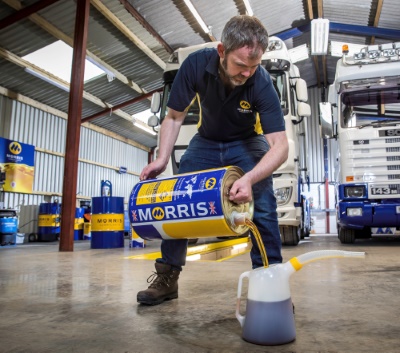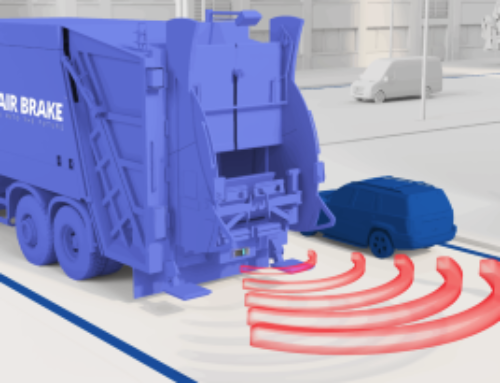Morris turns spotlight on lubricant specification
Morris Lubricants has highlighted some of the latest considerations for CV fleets regarding engine oil selection, as the market continues to reduce emissions and meet new regulations.
“Over the years there has been significant change in the requirements, specifications and formulations of heavy-duty diesel engine oils used in commercial vehicles,” said Adrian Hill, Morris Lubricants’ technology manager.
“There is a continual focus on ensuring commercial vehicles continue to become more fuel efficient in a move towards reducing emissions – and the natural solution tends to fall on engine technology. However, correct heavy-duty engine oil use can also make a significant contribution to reducing emissions.”
Going back just 15 years, operators were likely working with just one or two main engine oils, says Adrian – but today, there are numerous different oil specifications on the market, meaning that operators need to be fully abreast of the formulations available.
“It is vitally important that the correct heavy-duty engine oil is used,” he added.
Oil film thickness is an area that has seen major upgrades.
“To keep pace with changes to engine designs, engine oil formulations have also needed to evolve,” he explained.
“Improvements in fuel efficiency can be made by using engine oils that produce thinner oil films in the bearings and the ring/liner area. Thinner oil films result in less drag and therefore more useable energy goes to the wheels.
“To ensure that component integrity is not compromised, these thinner oil films are fortified with polymer chemistry to ensure there is no metal-to-metal contact. Polymers are essential when formulating 5W-30 and 0W-20 engine oils for the commercial vehicle market, with the environmental benefit of fuel efficiency resulting in reduced CO2, which is one of the targets of Euro VII.”
 With the increasing complexity of engine designs and the wide variety of aftertreatment devices that are now added to trucks to help reduce emissions, says Adrian, maintaining commercial vehicle fleets has certainly changed in recent times.
With the increasing complexity of engine designs and the wide variety of aftertreatment devices that are now added to trucks to help reduce emissions, says Adrian, maintaining commercial vehicle fleets has certainly changed in recent times.
“But what has remained consistent, regardless of company size is that vehicles must be kept on the road to protect profits,” he continued.
“Trucks will be on the road for long periods of time which puts a huge demand on the engine. A truck that is always in a workshop does not earn any money and can lead to increased costs and of course, lost business.
“As highlighted earlier, oil formulations in newer engine designs are becoming thinner. In particular, the oil film thickness for certain commercial vehicle engines is similar to passenger car levels. Heavy-duty diesel engines must be capable of using these oils without accelerated wear and related issues taking place.
“Heavy-duty engine oil choice is becoming more complex. Operators must therefore make sure they follow the manufacturer’s guidelines and use parts and consumables that cover original equipment manufacturer (OEM) specifications.
“Meeting servicing intervals is essential and to skip a service will be costly in the long run. Using old or the wrong oil will cause the engine to run poorly, with lack of power and there will be unseen damage being caused. If not cared for correctly, the engine may end up needing a timely and costly overhaul.”
 Global lubricant specifications from ACEA and API have been developed for lubricants to suit new engines and their emissions demands, says Adrian, but the OEMs are taking it further by tailoring these standard specifications and adding their own testing sequences.
Global lubricant specifications from ACEA and API have been developed for lubricants to suit new engines and their emissions demands, says Adrian, but the OEMs are taking it further by tailoring these standard specifications and adding their own testing sequences.
“Most of the oil manufacturers are already factory-filling new vehicles with 5W-30s and then requiring this grade of oil during service fill. In the meantime, the oil technology providers are developing 0W-20s and 5W-20s engine oils that will enter the market over the next couple of years to drive down CO2 output even further,” he said.
“Scania, MAN and Iveco are already specifying these low-viscosity lubricants, with the other main commercial vehicle manufacturers having specifications in draft form that will become factory fill to start with, before entering the service fill market.”
The Versimax range of heavy-duty diesel engine oils from Morris Lubricants, have been formulated for previous and current generations of engines.
“These engine oils work with the various aftertreatment devices found on commercial vehicles, as well as to help to reduce downtime, assist in the improvement in fuel efficiency and, of course, contribute to the reduction in engine emissions,” he added.
“The Morris Lubricants’ range of engine oils is used by fleet operators, maintenance technicians, mechanics and drivers to rationalise usage where mixed fleets of vehicles and engine technologies are in operation.
“As highlighted earlier engine oil choice should not be taken lightly, and the OEM’s guide should always be followed. The mixing of different types of oil must always be approached with caution, as using an inferior oil could cause damage or premature failure. As always, seek professional advice if there is any doubt.
“By selecting the correct oils and lubricants, operators have the best opportunity to keep commercial vehicles out of the workshop and earning their keep on the road.”
Further information can be found on the commercial vehicle section of the Morris Lubricants website – or via the company’s whatoil online oil finder, which allows users to enter a truck registration number to find the ideal oil for a vehicle.













